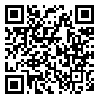Volume 28 - Supplementary
IBJ 2024, 28 - Supplementary: 29-29 |
Back to browse issues page
Download citation:
BibTeX | RIS | EndNote | Medlars | ProCite | Reference Manager | RefWorks
Send citation to:



BibTeX | RIS | EndNote | Medlars | ProCite | Reference Manager | RefWorks
Send citation to:
Nournezhad H, Ahmadi Z, Baghaei R, Yas A. Perceived Anxiety and Fears of COVID-19 Virus Infection and Their Relationship with Health Related Quality of Life Among Patients with Diabetes Mellitus. IBJ 2024; 28 :29-29
URL: http://ibj.pasteur.ac.ir/article-1-4404-en.html
URL: http://ibj.pasteur.ac.ir/article-1-4404-en.html
Abstract:
Introduction: The COVID-19 pandemic and its associated circumstances have significantly impacted patients with chronic diseases. This study aimed to evaluate the correlation between perceived anxiety and fear related to COVID-19 and the health-related quality of life in patients with type 2 diabetes.
Methods and Materials: This descriptive-correlational study was conducted on 387 patients with type 2 diabetes referred to Comprehensive Health Centers in Urmia during 2019-2020. The sampling was carried out using a multi-stage random sampling method. Data collection tools comprised a demographic information questionnaire, the Fear of COVID-19 Scale, the Anxiety of COVID-19 Scale, and the Short Form 36 health survey. The data were analyzed using SPSS 19 software with a significance level of 0.05, utilizing descriptive and analytical statistical methods, including Pearson correlation.
Results: The average quality of life was (56.6 ± 11.5), with the Mental Component Summary (59.5 ± 14.6) showing a higher mean compared to the Physical Component Summary (53.6 ± 14.1). Significant associations were found between age, duration of diabetes, education level, history of other diseases, history of taking other medications, and economic status with fear and anxiety scores. There was a significant and negative correlation between anxiety (r = -0.543; p = 0.01) and fear (r = -0.433; p = 0.01) scores with quality of life. Furthermore, a significant and inverse relationship was observed between quality of life components such as physical function, role limitations due to physical problems, role limitations due to emotional issues, energy/fatigue, emotional well-being, social function, and general health with anxiety or fear (p = 0.05).
Conclusion and Discussion: Fear and anxiety related to COVID-19 have detrimental effects on various aspects of diabetic patients’ quality of life. Addressing these patients’ fears and anxieties during infectious disease outbreaks is essential to enhancing their quality of life.
Methods and Materials: This descriptive-correlational study was conducted on 387 patients with type 2 diabetes referred to Comprehensive Health Centers in Urmia during 2019-2020. The sampling was carried out using a multi-stage random sampling method. Data collection tools comprised a demographic information questionnaire, the Fear of COVID-19 Scale, the Anxiety of COVID-19 Scale, and the Short Form 36 health survey. The data were analyzed using SPSS 19 software with a significance level of 0.05, utilizing descriptive and analytical statistical methods, including Pearson correlation.
Results: The average quality of life was (56.6 ± 11.5), with the Mental Component Summary (59.5 ± 14.6) showing a higher mean compared to the Physical Component Summary (53.6 ± 14.1). Significant associations were found between age, duration of diabetes, education level, history of other diseases, history of taking other medications, and economic status with fear and anxiety scores. There was a significant and negative correlation between anxiety (r = -0.543; p = 0.01) and fear (r = -0.433; p = 0.01) scores with quality of life. Furthermore, a significant and inverse relationship was observed between quality of life components such as physical function, role limitations due to physical problems, role limitations due to emotional issues, energy/fatigue, emotional well-being, social function, and general health with anxiety or fear (p = 0.05).
Conclusion and Discussion: Fear and anxiety related to COVID-19 have detrimental effects on various aspects of diabetic patients’ quality of life. Addressing these patients’ fears and anxieties during infectious disease outbreaks is essential to enhancing their quality of life.

Type of Study: Full Length/Original Article |
Subject:
Cancer Biology
| Rights and permissions | |
 |
This work is licensed under a Creative Commons Attribution-NonCommercial 4.0 International License. |







.png)
